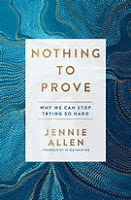 |
| The blessings of not being enough |
What if you’re not enough? What if that’s a good thing?
In her book Nothing to Prove, Jennie Allen explores these two questions and reaches a series of counter-intuitive answers about God’s love, our own need, and the exciting place where the two meet.
Allen argues that—no matter how talented, lucky, or hard working you are—you will inevitably find that you are not enough to meet every demand, fulfil every expectation, or reach every goal. But, instead of being a source of despair, this lack is a chance to find genuine freedom in God’s all-sufficient love. When you let go of the endless pressure to prove your own worth, you can rest in a God who wants to prove that His love is greater than you can imagine.
Nothing to Prove centers around two images: a backpack and a fountain of water. The backpack represents the stresses and pressures, insecurities and fears that Allen says we all haul around with us. But rather than break our backs carrying an impossible load, Allen counsels, we can acknowledge that the strain is too much and lay down the load. The second image, that of a fountain, represents Jesus and his ability to quench our thirst in a way that nothing else can. Allen makes it clear: when we give up on trying to be enough in ourselves, or to satisfy our needs on our own, we’re able to see that God is strong enough and good enough to give us everything that we need in abundance.
Allen writes with a down-to-earth style that transitions smoothly between Bible commentary, personal stories, and reflection. In each chapter, Allen reiterates and builds on ideas and images from earlier in the book, so whether you read Nothing to Prove in a sitting or in snippets, there’s small chance of getting lost. Part one of the book is mainly an introduction to the concept that not being enough is not just ok, but necessary if we want to learn more about God’s sufficiency. Part two continues to make the idea personal with reflection questions and a series of Bible stories to consider.
Chatty, honest, and probing, Allen describes an exciting alternative to our attempts to prove ourselves—trust in the One who has already proved that He’s more than enough.